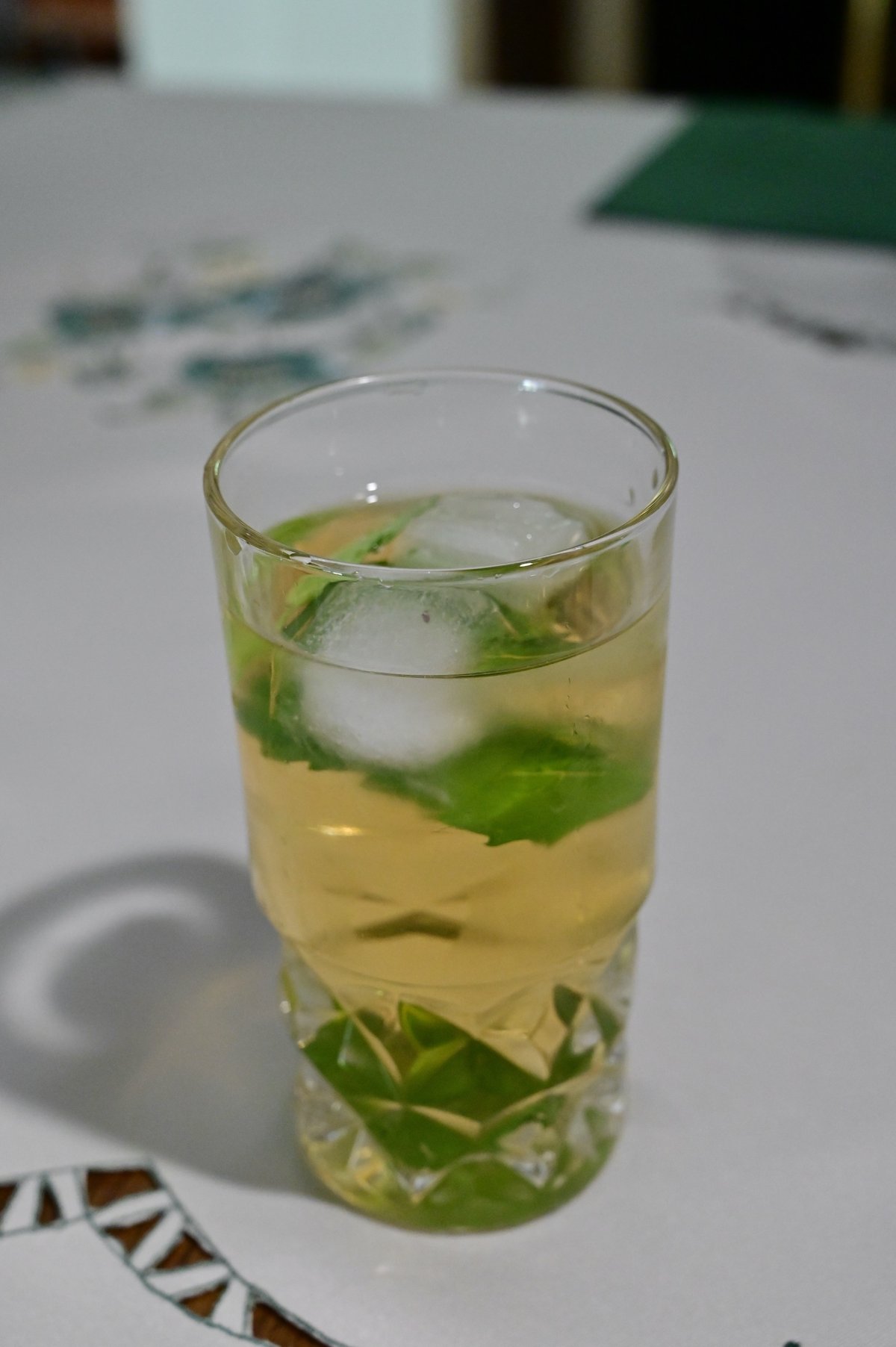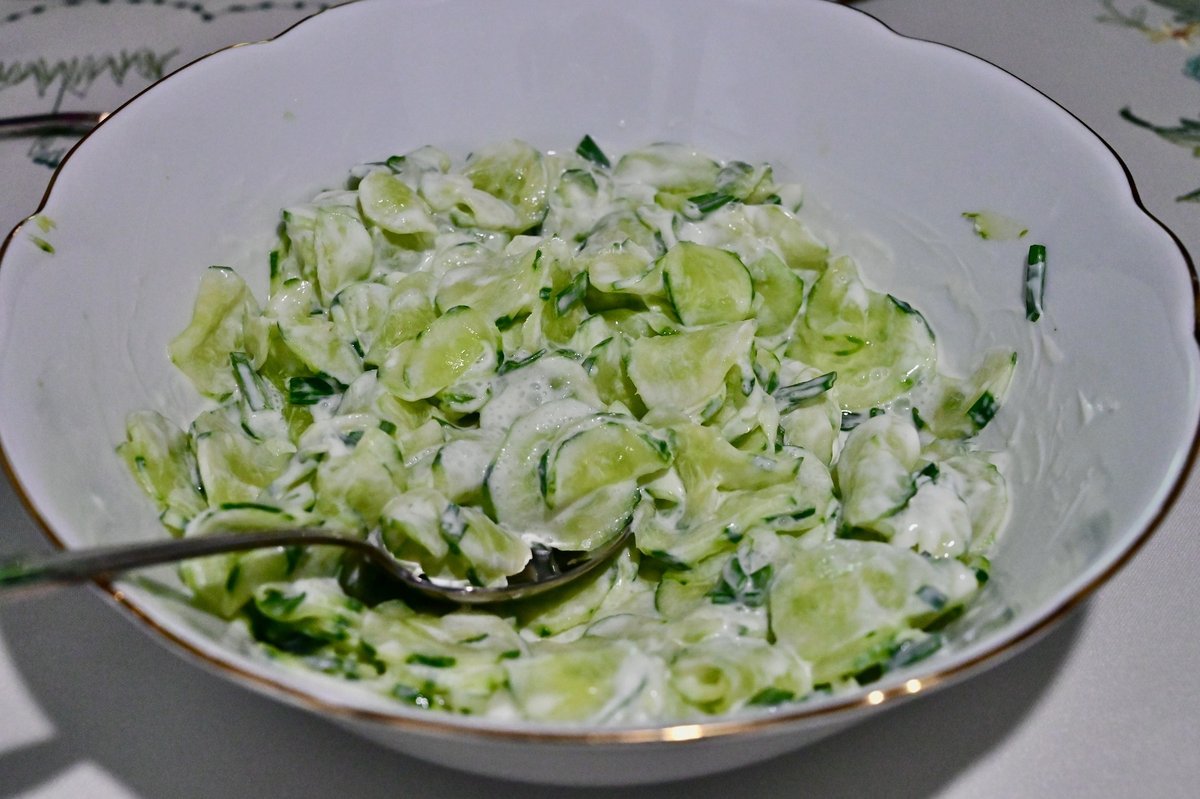
ポーランド・クラクフ編6:クリス元大佐の奥様の手料理
2022年7月3日日曜、昼食は通訳兼ガイドのクリス元大佐のご自宅に招待され、キュウリのピクルスのスープ「ズッパ・オグルコヴァ」をはじめ、奥様の手料理をいただいた。
English follows Japanese
ガイドのクリス元大佐はポーランド空軍パラシュート部隊出身!
2022年7月3日日曜、昼食はクラクフで5日間お世話になった通訳兼ガイドのクリス・マムチュー元大佐のご自宅に招待され、奥様の手料理をいただくことになった。
取材していたユダヤ文化祭もこの日が最終日。夜にはイスラエルの女性歌手リラズのコンサートが残っていたが、そのほかは午前中にインタビューが一本入っていただけで、午後はスケジュールが空いていた。それを前日のうちにクリス元大佐に伝えると「我が家に招待します。私の妻が家庭料理を作ってもてなしますから」と誘ってくれた。
正午過ぎ、ホテルから一歩表に出ると、目の前に停まっていた黒いホンダ・アコードからクリス元大佐がニコっと顔を出してきた。
「道が狭いから早く乗って下さい。アコードは本当に良いクルマです。これまで一度も故障したことがないんですよ。日本のクルマは最高です。君はどんな車に乗っているんですか? 何、ドイツ車? 日本人なら日本車に乗りなさい!」
日曜の午後、クラクフ市内の道路はそこそこ混んでいた。15分かけて市街地を抜け、北西に向かって広い道路を進むと、正面の空に夏らしい大きな積乱雲が見えてきた。するとクリス元大佐が急に大声を上げた。
「キュムロニンバス!」
「どういう意味ですか?」
「ラテン語で積乱雲という意味の国際気象用語です。以前話したとおり、私はポーランド空軍のパラシュート部隊所属だった。世界中、パラシュート部隊では言葉の混乱を防ぐために、英語やフランス語ではなくラテン語の国際気象用語が用いられるのです。キュムロニンバス! 君も覚えておくと良い。

私は現役時代、世界中の紛争地域に派遣されました。1980年代にはレバノンやゴラン高原やポルポト時代のカンボジアにも行きました。おかげで世界中に友人が出来たし、英語も話せるようになりました。仕事は充実していたけれど、軍の年金が出る50歳のときに除隊しました。アーリーリタイアです。それからは、得意の英語を使って、こうして観光ガイドをしたり、通訳をしたり。2000年頃にはポーランド人の団体客を引率して、日本に行ったこともあります。日本中を周り、京都でゲイシャ遊びもしました。懐かしいですねえ。
これまでクラクフで色んな国のお客さんを案内してきました。でも、日本人を案内するのは君が初めてです。それに君のように毎日ポーランド料理ばかり食べたがる人は珍しいですよ、イタリア料理や中華料理やファストフードもあるのに。しかし、クラクフのレストランはどこも観光客向けだから、毎日食べ続けると胃腸がもたれるでしょう。ポーランド料理は家庭料理こそ美味しいです。今日は君が食べたがっていた料理、ズッパ・オグルコヴァを妻が用意しています」
地下貯蔵庫でロシアが攻めて来ても持ちこたえる!
クリス元大佐の自宅はクラクフ北西部を走る幹線道路から少し入った新しい住宅地にあった。近くには北欧家具のIKEAの大型ショップもあった。クラクフ空港が近いらしく、飛行機の爆音が頭上からひっきりなしに流れる。ガレージに自慢のアコードを停め、庭付きの広い家に通された。すると台所から鮮やかな青の花柄のワンピースを着た優しそうな目をした奥様が顔を出し、ポーランド語で話しかけてきた。もちろん僕はポーランド語は一言も解さない。

「妻は英語は話さないんですよ。君がポーランド料理に興味を持ってくれて嬉しいそうです」

奥様がランチの用意をしている間にクリス元大佐がご自宅を案内してくれた。一階にはキッチンと広いリビングがあり、その奥が広い裏庭になっていた。2階と3階は寝室や客室、バスルームがあり、2人には十分広い。そして驚いたのが半地下の食料倉庫だった。
床の蓋を外すとはしごがあり、そこをかかんで降りた。すると高さ1.8m、広さ3畳ほどの貯蔵庫になっていて、奥の壁面に背の高い金属の収納棚が並び、パスタ、各種ソース、瓶詰め、缶詰、トマトケチャップ、手作りのピクルス類、そしてワインやウォッカなど、ありとあらゆる保存食品が収納されているのだ。すごい!ここにあるものだけでも一冬は過ごせそうじゃないか。

「これでロシアが攻めて来てもかなり長期間耐え忍べます。実際、ロシア軍はここから数百kmも離れていないウクライナに攻めてきているんです!」とクリス元大佐。確かに! ロシアによるウクライナ侵攻以降、ヨーロッパが直面している危機を改めて思い知った。また同時にGNPの値だけでは測れない、ヨーロッパの食料自給率の高さ、大陸の豊かさも感じてしまった。

ズッパ・オグルコヴァはポーランドのすまし汁
さて、リビングに戻ると、奥様が料理をテーブルに運んできてくれた。まずは今日の主役であるキュウリのピクルスのスープ「ズッパ・オグルコヴァ」。きゅうりのピクルス「オグレク」をチーズおろし金などですりおろし、加工肉や野菜を煮たスープに加えた発酵食品スープである。オグレクは塩水とディルなどのハーブで漬けたピクルスで、日本やアメリカのピクルスのように砂糖は入れていない。

奥様のズッパ・オグルコヴァは黄緑色がかった澄んだスープに人参やじゃがいもなどの具材が浮かんでいて、表面にはディルとパセリのみじん切りが少々。好みでサワークリームを浮かべるが、見た目はかなり地味、というか、すまし汁や具の少ない味噌汁のようだ。
さっそく澄んだスープをスプーンですくって口に入れると、酸っぱい!そして同時に加工肉と野菜の出汁がやさしくて美味しい。酸っぱいのは一年漬けた古漬けのオグレクを使っているためという。ほんの少しのじゃがいもと人参、セロリが具材で、手早く用意した日本の味噌汁に通じる。

なるほど、これまで僕はオグレクを自分で作るところから始め、自宅で何度もこのスープを作っていた。だが、僕はじゃがいもや加工肉などの具材をたくさん入れすぎていた。僕が作ったものが豚汁とすると、この日いただいたものは味噌汁のようにシンプルだったのだ。
自宅でエスニック料理を作るとき、できるだけ本物に近づけたいという思いから、気合を入れすぎて、具材多めに濃厚に作りすぎてしまうことがよくある。ズッパ・オグルコヴァも、美味しいオグレクさえ用意できれば、後は素材の味にまかせてしまえば良いのだ。

奥様の手料理の数々
さて、オグルコヴァのほかにテーブルに並んだのはスライスしたキュウリの水切りヨーグルト和え。これはイタリア語起源の『Mizeria=惨め』と呼ぶのだそう。理由は野菜が満足に買えない人が作る料理だからとのこと。いやいや、立派な一品だし、これにおろしニンニクを入れたものはトルコやギリシャでも前菜として人気がある。けっして惨めな料理じゃない。

そして、もう一品はクリス元大佐自ら腕を奮った仔牛とポルチーニのサワークリーム煮込み。野生のキノコは夏秋のポーランドを代表する食材。特にポルチーニとアンズタケは人気が高い。旬の季節は限られているが、乾燥させたものと冷凍させたものなら一年を通じて手に入る。クリス元大佐は冷凍食品のポルチーニを使ったそう。淡白な薄切りの仔牛肉がポルチーニの出汁とサワークリームをまとって実に濃厚な味に仕上がっている。これも美味い!美味すぎる!

「妻の手料理を気に入っていただけましたか? ポーランド料理は土地の食材を使ったシンプルな料理です。君はまた近いうちにポーランドに来そうですから、次回はまた違うスープを用意して待っていますよ」

Mrs. Mamczur's Home-Made Cooking
My Guide, Kris is former Polish Air Force's Special Forces!
On July 3rd, 2022, Sunday, I was invited to the home of Kris, the former Colonel who worked as my interpreter and guide during five-days stay in Krakow. His wife would be preparing a home-cooked meal for us. It was the final day of the Jewish Culture Festival, which I had been covering. There was a concert by Israeli singer Liraz in the evening, but apart from that, I only had one interview scheduled in the morning, leaving the afternoon free. I had informed Kris the day before about my free schedule, and he extended the invitation, saying, "I will invite you to my home. My wife will prepare traditional homemade dishes for you."

In the early afternoon, as I stepped out of the hotel, Kris appeared with a smile on his face from his black Honda Accord parked right in front. "Hop in quickly because the roads are narrow. The Accord is a really good car. It has never broken down on me. Japanese cars are the best. What kind of car do you drive? A German car? If you're Japanese, you should drive a Japanese car!"

On Sunday afternoon, the roads in Krakow city were moderately crowded. We spent about 15 minutes navigating through the city center and then headed northwest on a wide road. Soon, we noticed large cumulus clouds in the sky, typical of summer. Kris suddenly exclaimed, "Cumulonimbus!" I asked him what it meant, and he explained, "It's an international meteorological term in Latin that means cumulus clouds. As I mentioned before, I used to be part of the Polish Air Force's parachute unit. In parachute units around the world, we use international meteorological terms in Latin to avoid confusion, instead of English or French. Cumulonimbus! It's good to remember. During my active service, I was deployed to conflict zones all over the world. In the 1980s, I went to places like Lebanon, the Golan Heights, and Cambodia during the Pol Pot era. Thanks to that, I made friends all over the world and learned to speak English. I had a fulfilling career, but I retired at the age of 50 when I became eligible for military pension. It was early retirement. Since then, I've been using my English skills to work as a tourist guide and interpreter. Around the year 2000, I even led a group of Polish tourists to Japan. We traveled all over Japan, and I even experienced the geisha culture in Kyoto. Those were nostalgic times."
"I've guided visitors from many countries in Krakow, but you're the first Japanese person I'm guiding. Moreover, it's rare to find someone like you who wants to eat Polish cuisine every day, even if you have Italian, Chinese, and fast food options available. However, most restaurants in Krakow are touristic, so if you eat Polish food every day, you might feel heavy. Polish home-cooked meals are more delicious. Today, my wife has prepared the dish you wanted to try, Zupa Ogórkowa."

Kris's home was located in a newly developed residential area slightly off the main road running northwest of Krakow. There was a large IKEA store nearby. The Krakow Airport seemed to be close by, as the noise of airplanes flying overhead was constant. Kris parked his prized Accord in the garage, and I was led into a spacious house with a garden. From the kitchen, his kind-eyed wife emerged wearing a vibrant blue floral dress and spoke to me in Polish. Of course, I couldn't understand a word of Polish. Kris explained, "My wife doesn't speak English, but she's delighted that you have an interest in Polish cuisine.
We can survive with Basement Food Storages, even if Russia invades
While his wife was preparing lunch, Kris gave me a tour of their home. On the first floor, there was a kitchen and a spacious living room, leading to a large backyard. The second and third floors consisted of bedrooms, guest rooms, and bathrooms, providing ample space for both of them. What surprised me was the basement food storage area.
He removed the floor cover and descended the ladder. We found ourselves in a storage room measuring about 1.8 meters in height and about 4sq.m. Along the back wall were tall metal storage shelves, filled with various pastas, sauces, canned goods, pickled vegetables, homemade pickles, as well as wine and vodka. It was incredible! We can survive with them through an entire winter.
"We could endure for a few months even if Russia invades. In fact, the Russian army is currently attacking Ukraine, which is only a few hundred kilometers away from here!" said Kris, emphasizing the relevance of the situation. Certainly, since the Russian invasion of Ukraine, I had been reminded of the crisis Europe was facing. At the same time, I could appreciate the high self-sufficiency of European food production and the abundance of the continent, something that cannot be measured by GDP.
Zupa Ogórkowa is similar to Miso Soup
Returning to the living room, Kris' wife brought the food to the table. First, we had the star of the day, "Zupa Ogórkowa," a cucumber pickle soup. It was a fermented food soup made by grating pickled cucumbers called "Ogórek" with a cheese grater and adding them to a soup made with processed meat and vegetables. Ogórek is a pickled cucumber preserved in brine with herbs like dill, without the addition of sugar, unlike pickles in Japan or the United States.
Kris' wife served a clear soup with a slightly yellowish-green hue, with carrot and potato pieces floating on the surface, garnished with finely chopped dill and parsley. Sour cream could be added according to personal preference, but visually, it was rather plain, resembling a simple miso soup or a light soup with minimal ingredients.
I scooped up a spoonful of the clear soup and tasted it. It was sour! Simultaneously, the broth made from processed meat and vegetables was gentle and delicious. The sourness came from using well-aged pickled Ogórek. The ingredients consisted of a small amount of potato, carrot, and celery, reminiscent of a quickly prepared miso soup in Japan.
I realized that until now, when I made Ogórek and prepared this soup at home, I had been adding too many ingredients such as potato and processed meat. If my version of the dish was considered a pork soup, the one I had that day was more like a simple miso soup.
When I try to recreate ethnic dishes at home, I often put too much effort into making them as authentic as possible, resulting in an excessive amount of ingredients and rich flavors. With Zupa Ogórkowa, once you have the delicious Ogórek, you can let the natural flavors of the ingredients shine without adding too much.
The Other Home Maid Cookings
Now, in addition to the Ogurkova, there was another dish on the table, which was sliced cucumber with drained yogurt. It's called "Miseria", which translates to "Misery." The reason behind this name is that it's believed to be a dish prepared by people who can't afford to buy enough vegetables. However, let me assure you, it was a splendid dish, and the version with grated garlic is popular as an appetizer in Turkey and Greece as well. It is by no means a miserable dish.
Another dish Kris prepared himself was a sour cream stew with veal and porcini mushrooms. Wild mushrooms, such as porcini and chanterelles, are renowned seasonal ingredients in Poland, especially during the summer and autumn. Although their peak season is limited, dried or frozen varieties are available year-round. Kris mentioned that he used frozen porcini for the dish. Thinly sliced, tender veal meat was cooked in a rich sauce made from porcini broth and sour cream. The result was a remarkably flavorful dish. It was delicious—almost too delicious!
"Did you enjoy my wife's homemade dishes? Polish cuisine is all about simple dishes made with local ingredients. Since you're planning to visit Poland again soon, we'll prepare a different soup for you next time and wait for your return," Kris remarked.
I expressed my gratitude and complimented their culinary skills. We continued to savor the meal, enjoying the diverse flavors and the warmth of their hospitality. It was a truly memorable experience, not just for the delicious food but also for the cultural exchange and the bonds formed during our time together.
As I left Kris' home later that afternoon, I couldn't help but feel fortunate to have been invited into their world, to taste the essence of Polish home cooking and hear stories of Kris' military experiences. It was a unique and enriching encounter that further deepened my appreciation for the power of food in bringing people together and bridging cultural gaps.
And so, with a heart full of gratitude and a satisfied appetite, I bid farewell to Kris and his wife, carrying the flavors and memories of that special lunch in Krakow with me as I embarked on my next adventure.
